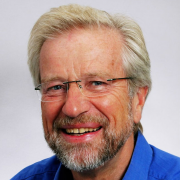I studied medicine at the universities of Heidelberg and Berlin in the late 1960s and early 1970s. During those years I got involved in the 1968 student revolt against the “establishment”. Post-war Germany at that time was narrow-minded and conservative in its attitudes. Many professors at the universities had cooperated with the Nazi regime and were still in charge as directors of clinics and departments. My friends and I were committed to change and innovation at the medical faculties and we were actively opposed to “authorities of the old regime”. All in all this was a very fascinating time for me. I learned a lot about the international reform movements elsewhere in the world and “the winds of change”.
I was also lucky. The supervisor of the thesis for my medical degree, who was a critical scientist and citizen as well, got an appointment to the chair of clinical neurophysiology at Hanover Medical School, which was one of the three reform universities in Germany established in the late 1960s. So I finished my studies in Berlin, passed my medical qualifying examinations and moved to Hanover Medical School to continue to work with my thesis supervisor.
I undertook training in neurophysiology and neurology in Hanover for several years, during which I was engaged in research on psycho-physiological methods in the identification of basic emotions. I finished my doctoral thesis in medicine in 1975.
After that I was attracted to modern social psychiatry, which was at a high innovative standard at Hanover Medical School. So I completed my psychiatric, psychotherapeutic and psychoanalytic training at the Department of Psychiatry, following which I was appointed to the faculty of the Department of Psychiatry at Hanover Medical School, in 1983. By that time I had completed all my psychiatric and psychotherapeutic training and I was looking for new challenges.
That was when transcultural psychiatry came into the focus of my interest. The head of the Department of Psychiatry at Hanover had spent several years in Vietnam, as a lecturer at Hué University Faculty of Medicine and had done some comparative psychiatric research there. I became interested in this kind of research and was able to obtain funding for my first transcultural psychiatric field research project.
I planned to study the treatment of mentally ill Africans by traditional healers in remote rural regions, where western psychiatric influence was still unknown. My wife and I had a physician friend at that time, who was a development aid worker in Malawi, in south-eastern Africa, working in the outskirts of the capital of Lilongwe. From him I got information about the existence of a well-developed traditional healing system in Malawi. Accordingly, we decided to do field research there. My wife and I, and our two children aged four and five, migrated for several months to Malawi.
For me and my family, this was probably the most fascinating encounter with a foreign culture we ever had. I had been in Japan before that, and later spent some time in China, but the “African mind” and its interactive emotional encounters strongly influenced and impressed us right from the beginning. We travelled all around the country, as well as the neighbouring countries of Zimbabwe, Zambia and Mozambique. We met very experienced traditional healers, including one who was living in Likoma Island in Lake Malawi, who had treated the president of Malawi.
I got involved in the healing practices and rituals used for the treatment of patients with psychosis, depression, epilepsy and psychosomatic disturbances. And I learned that the traditional healing practices used in Malawi were effective. In a one-year follow-up study which I performed with a psychologist I became friendly with, we could show that schizophrenic and psychosomatic African patients had a therapeutic outcome comparable to that in Germany, or even better, and without the use of psychopharmacological treatment.
So when I returned to Hanover, I realized that while I was in Africa, my professional views had undergone a metamorphosis. I had developed a critical and more detached ethnological view of standard western therapeutic methods and thinking. I was looking at western therapeutic rituals applied to mentally ill patients from an ethnic and emic point of view. This experience has had a sustained influence on my therapeutic and research work in the years that followed.
Being back in Germany and just having coped with the cultural re-adaptation, I received an appointment to be professor of psychiatry and deputy director at the psychiatric clinic of the University of Cologne. So I migrated from the “cool and clear” Nordic people of Hanover in Lower Saxony, to what was referred to as “the “most northern capital of Italy”, Cologne, with its Italian-like people living on the banks of the Rhine.
During the following years in Cologne I had the most exciting experiences due to my migration within the borders of Germany. My acculturation process was associated with a lot of stress and lasted for more than two years. It took that long for me and my family to become adapted to living in Cologne.
In 1994 I was appointed as professor and head of the Department of Social Psychiatry and Psychotherapy at Hanover Medical School. My family and I migrated back to Hanover.
The main priorities of my scientific interest were now integrated; psychotherapy of psychoses, evaluation of community mental health systems, and research in transcultural psychiatry and immigration.
My co-workers and I developed the regional community psychiatric care system of Hanover as a model associating the principles of easy access and culturally-sensitive integration of migrants into the regular psychiatric services. I formed a research group on transcultural psychiatry and migration which was very active in clinical work and research. We established guidelines for the treatment and integration of migrants into the regular mental health services well known in German-speaking countries as the “Sonnenberger Leitlinien” (Sonnenberg Guidelines).
Acting as the head of the Section of Transcultural Psychiatry and Migration of the German Association for Psychiatry, Psychotherapy and Nervous Diseases (DGPPN) and being the president of the Ethno-Medical Centre of Hanover, it became possible to direct the focus of interest of the professionals in the field of mental health and the health care system in Germany to the needs and therapeutic requirements of migrants and asylum seekers who had immigrated to Germany. So we were able to make a contribution to a considerable improvement in the health and mental health care of migrants in our country.
In the years to come I will continue to contribute to the research work of Central European migration, including work on the nature of mental disturbances in migrants, the causes of its manifestations in the migration-process, culture-sensitive psychotherapy, and innovative prevention strategies. At the present time, in cooperation with the Ethno-Medical Centre, we are performimg a study sponsored by the German government on prevention of addiction in migrants, testing the efficacy of several new approaches.
Beyond that I am still active in writing and publishing papers and editing books (up to now more than 200 papers and 20 books), most of them written and published in German. My most recent book on migration, edited in 2006, with the title “Die Sonnenberger Leitlinien”, focused on concepts and experiences in the integration of migrants with mental problems into the regular psychiatric-psychotherapeutic services in central and northern European countries.
There is a great demand for information processing on transcultural psychiatry and psychotherapy and culture-sensitive treatments in migrants for professionals in German-speaking countries, and I plan to continue my work in this field in the years ahead.
I confess that I am a bit jealous of colleagues who are able to write papers in English as fluently as in their mother-language. I continue to work toward that goal. Recently I published a paper in English, which was the editorial of the September 2007 issue of Acta Psychiatrica Scandinavica (116: 161-164, 2007) on alternative and unconventional treatment methods in migrants and citizens.
But what I prefer most, beyond my professional work, is adventurous travels to remote countries. My next trip has already been scheduled. Together with my son and a friend, I will travel to “the world`s end”, to Patagonia, in January and/February 2008, backpacking of course. I am eager to say “hello” to the “curanderos” in that part of the world and ‘set foot’ on Cape Horn.
I thank Ron Wintrob very much for his help in editing this bio-sketch.
Prof. Dr. Wielant Machleidt Dpt. Social Psychiatry and Psychotherapy Medical School of Hanover Carl-Neuberg-Str. 1 Germany E-mail: machleidt.wielant@mhhannover.de
December 5, 2007

